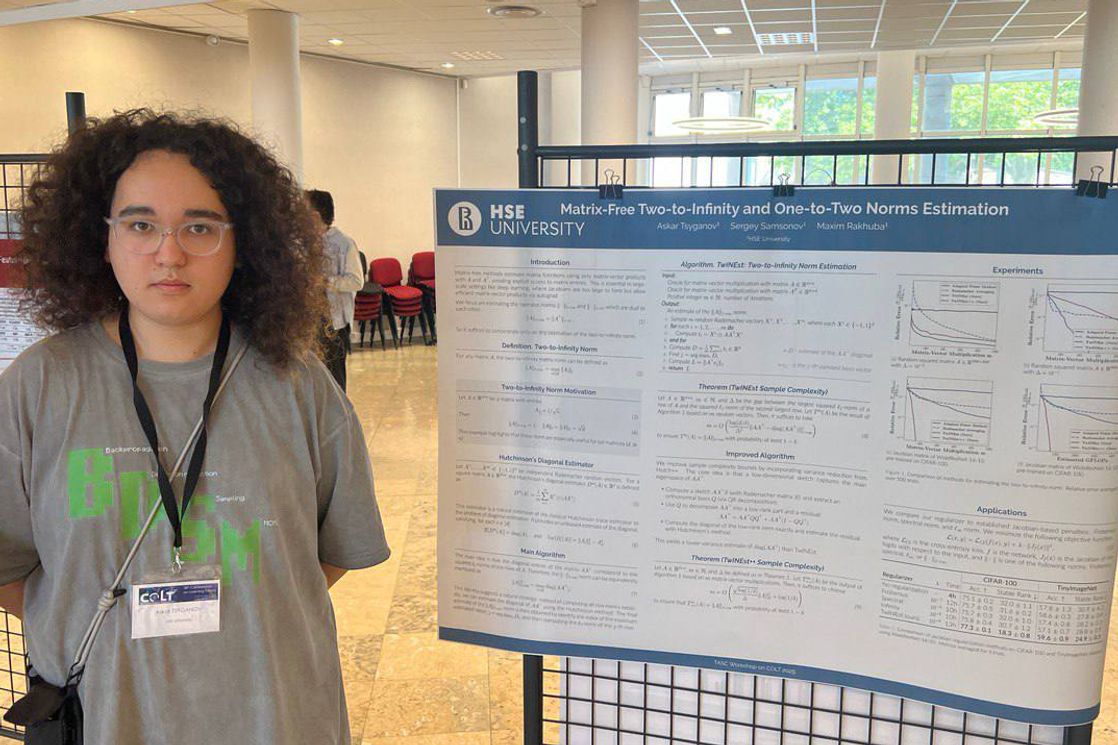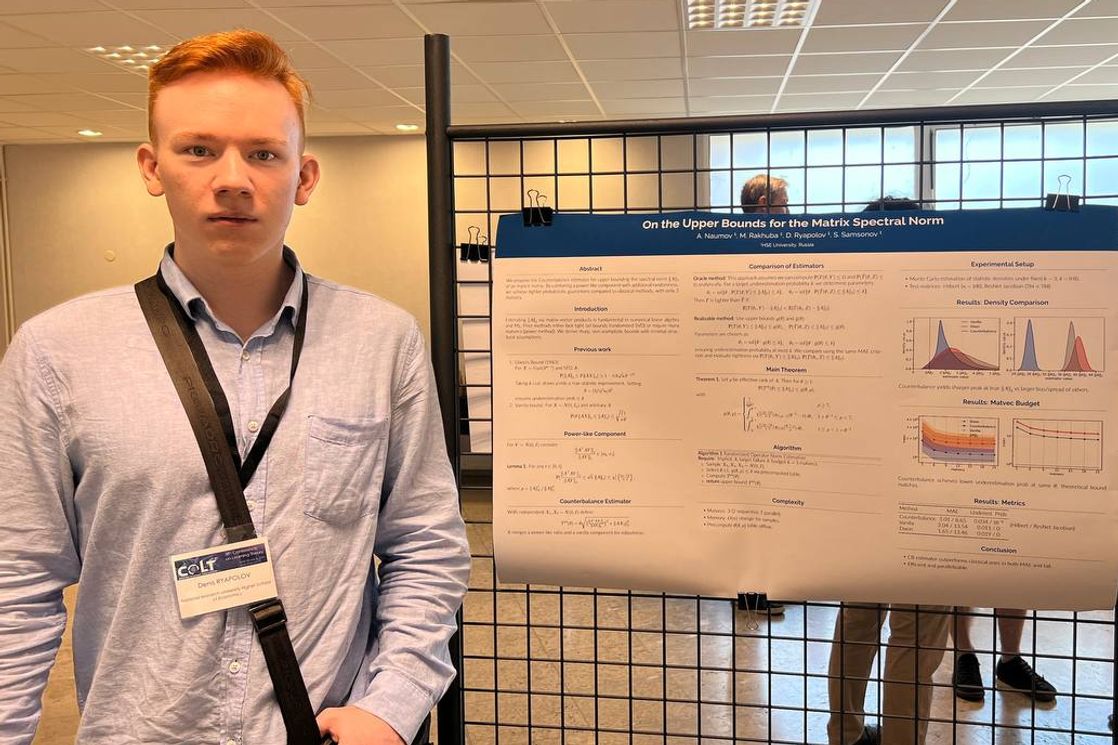Start of a Long Journey: Young HSE Scientists Contribute to Learning Theory at COLT 2025

Participation in high-level international events is crucial for the professional development of researchers starting their career in science. It provides an opportunity to exchange ideas, create promising teams, and make important connections. This summer, Denis Ryapolov and Askar Tsyganov, students of the Applied Mathematics and Computer Science programme and staff of the AI and Digital Sciences Institute at the Faculty of Computer Science of HSE University, attended the prestigious international Conference on Learning Theory, COLT 2025, which was held in Lyon, France. In an interview, they shared their experiences and impressions from the trip.
About the COLT 2025 Conference and the Debut Participation in Events of This Level
Askar Tsyganov: My colleague and I took part in the 38th Annual Conference on Learning Theory (COLT 2025), where we presented our research in a poster workshop session on ‘Theory of AI for Scientific Computing.’ This was my first experience at an event of this caliber. My previous experience was limited to a field session at the Faculty of Computer Science in Voronovo, which had a broader focus.
I wasn’t sure what to expect, but my goal was to meet and talk to researchers in related scientific domains. It worked out well: I found a poster on a similar topic and had a great conversation with its author. Besides attending lectures, I tried to do a lot of networking. While it wasn’t always seamless—as I’m still not used to speaking English—the conference served as an excellent starting point.

Askar Tsyganov is a research intern at the International Laboratory of Stochastic Algorithms and Multidimensional Data Analysis at the AI and Digital Sciences Institute, HSE University. His work focuses on the development and theoretical analysis of new, efficient stochastic machine learning algorithms.
Expectations of Conference Participation
Denis Ryapolov: Although I have previously presented my research papers at HSE University, this was the first time I was in a room with a couple of hundred mathematicians and artificial intelligence specialists. I was particularly struck by the diversity of the participants’ countries of origin.
I had several expectations. Firstly, I intended to successfully present my work and explain it in detail to as many people as possible at the poster session. Secondly, I wanted to experience the conference atmosphere, to participate on the same level with reputable scientists, and to study a few other reports on my own.
An International Conference is an Important Event for a Future Scientific Career
Denis Ryapolov: In my opinion, participating in international conferences is the most effective way to present your work to the community. This not only helps to promote your results and potentially get more citations but also allows you to find like-minded people with whom you can share your experience and vision for the field, including conducting joint research in the future.
The Most Interesting Topics Presented at the Conference
Askar Tsyganov: In addition to the workshop in which I participated, I was interested in the sessions on reinforcement learning and language models, which are very promising areas. It was interesting to hear reports on the theoretical foundations of these fields.
I presented a paper on randomised estimates of matrix norms. In my work, we consider a formulation where the matrix elements are not given explicitly, but the matrix can be multiplied by arbitrary vectors. My work is the first in this formulation to offer a way to evaluate two-to-infinity and one-to-two norms. My poster attracted the attention of many interested students and experienced researchers. Everyone appreciated the novelty of the algorithms and their theoretical sophistication. Furthermore, experienced participants offered ideas for improving the article.
What Attracted Attention among the Announced Reports and Sections
Denis Ryapolov: One of the conference’s main topics was generative modelling. In my free time, I often study this field with great interest, so I particularly enjoyed the reports on this topic. I would also like to mention a poster from the workshop on the stochastic approximation of matrices. Apart from the fact that this field partially overlaps with mine, the core idea of the work seemed very beautiful and elegant. On average, people were most drawn to the topics that are currently developing the fastest, such as generative modelling and reinforcement learning.

Overview of the Presented Research and the Impressions of the Conference Participants
Denis Ryapolov: My poster was dedicated to one of the sections of stochastic linear algebra—estimating the spectral norm of a matrix. Together with my academic supervisors, I have developed a stochastic algorithm that provides an effective upper bound on the spectral norm. It is important to note that, in addition to the standard advantages of the algorithm, we have proposed and analysed a fundamentally new approach to solving problems related to the upper estimates of matrix characteristics.
Denis Ryapolov is a research intern at the Scientific and Educational Laboratory of Matrix and Tensor Methods in Machine Learning at the AI and Digital Sciences Institute, Faculty of Computer Science. His research interests include the theory of random matrices and numerical analysis.
From the very beginning of the poster session, my poster was surrounded by about ten people who looked very interested. Although the average number of people decreased as the session continued, I was approached by experienced researchers from ETH, MIT, and DeepMind. Almost all of them asked precise and interesting questions, engaged in active dialogue, and noted the novelty and uniqueness of my work. I exchanged contacts with some of them.
One of the Key Conclusions or Insights Gained at the Conference
Askar Tsyganov: As my senior colleagues mentioned, COLT is a relatively small conference compared to others in our field. Here, if you are motivated, you can find time to chat with almost every participant. Therefore, it is an excellent place to establish contacts, which are very important in science.
Denis Ryapolov: I noticed that the conference participants who deal with both the theoretical and practical aspects of science often have more freedom of thought than pure theorists. I value versatility not only in life but also in science, so in the coming year, I plan to devote more time to practical projects.
Advice to Young Scientists Planning to Attend Their First Major International Conference
Askar Tsyganov: First of all, I advise everyone to communicate with other participants as much as possible. Someone might suggest how to further develop your research or could even become a future co-author. And, of course, make sure to review the posters on various topics. Perhaps something will catch your attention and inspire you to write an article on a similar subject.
Denis Ryapolov: Most likely, due to a lack of experience, you will not be able to grasp all the information immediately. Try to learn at least a little about the topics of the reports and posters in advance so you can process information more quickly on the spot. Also, try to create clear and visually appealing slides; this will help you make more useful connections with those who ask meaningful questions about your work.
See also:
HSE Scientists Optimise Training of Generative Flow Networks
Researchers at the HSE Faculty of Computer Science have optimised the training method for generative flow neural networks to handle unstructured tasks, which could make the search for new drugs more efficient. The results of their work were presented at ICLR 2025, one of the world’s leading conferences on machine learning. The paper is available at Arxiv.org.
HSE Participates in Conference on International Exchange of Professionals in China
From October 21 to 24, 2025, the 23rd Conference on International Exchange of Professionals took place in Shanghai and Beijing, bringing together more than 7,000 scientists and experts from around the world. HSE University was represented by Ivan Arzhantsev, Dean of the Faculty of Computer Science, and Vasily Gromov, Head of the Laboratory for Semantic Analysis of the Centre for Language and Semantic Technologies.
Quantity over Quality: How Publication Activity Leads to Crisis
Participants of the 4th Fall into ML conference at HSE University held a discussion titled ‘Academia in Crisis: What Does the Future Hold?’ In particular, they examined why the number of scientific publications continues to grow, what the quality of these papers is, what expectations should be placed on researchers, and what role artificial intelligence plays in preparing academic articles.
From Neural Networks to Stock Markets: Advancing Computer Science Research at HSE University in Nizhny Novgorod
The International Laboratory of Algorithms and Technologies for Network Analysis (LATNA), established in 2011 at HSE University in Nizhny Novgorod, conducts a wide range of fundamental and applied research, including joint projects with large companies: Sberbank, Yandex, and other leaders of the IT industry. The methods developed by the university's researchers not only enrich science, but also make it possible to improve the work of transport companies and conduct medical and genetic research more successfully. HSE News Service discussed work of the laboratory with its head, Professor Valery Kalyagin.
Analysing Genetic Information Can Help Prevent Complications after Myocardial Infarction
Researchers at HSE University have developed a machine learning (ML) model capable of predicting the risk of complications—major adverse cardiac events—in patients following a myocardial infarction. For the first time, the model incorporates genetic data, enabling a more accurate assessment of the risk of long-term complications. The study has been published in Frontiers in Medicine.
HSE Team Takes First Place in RuCode Algorithmic Programming Championship
On October 20, 2024, the final round of the RuCode Algorithmic Programming Championship took place, setting a new record in the Russian Book of Records as the ‘Largest Competitive Programming Event.’ The event, held simultaneously across 24 locations, hosted 1,450 participants divided into 500 teams. The overall winner of the senior team division was the M.O.S.C.O.W. team from the HSE Faculty of Computer Science (FCS).
HSE Teachers Awarded Yandex ML Prize
The awards ceremony for the international Yandex ML Prize was held in Moscow. This year, all three winners in the ‘ML Educators’ category were HSE faculty members—Evgeny Sokolov, Associate Professor and Head of the Big Data and Information Retrieval School, Anton Konushin, Associate Professor at the Faculty of Computer Science, and Aleksei Shpilman, Associate Professor at the Department of Informatics at HSE’s St Petersburg School of Physics, Mathematics, and Computer Science.
‘We Bring Together the Best Russian Scientists and AI Researchers at HSE University Site’
On October 25–26, 2024, HSE University’s AI and Digital Science Institute and the AI Research Centre hold the Fall into ML 2024 conference in Moscow. This year’s event will focus on the prospects in development of fundamental artificial intelligence, with SBER as its conference title partner.
Researchers at HSE in St Petersburg Develop Superior Machine Learning Model for Determining Text Topics
Topic models are machine learning algorithms designed to analyse large text collections based on their topics. Scientists at HSE Campus in St Petersburg compared five topic models to determine which ones performed better. Two models, including GLDAW developed by the Laboratory for Social and Cognitive Informatics at HSE Campus in St Petersburg, made the lowest number of errors. The paper has been published in PeerJ Computer Science.
HSE Researchers Demonstrate Effectiveness of Machine Learning in Forecasting Inflation
Inflation is a key indicator of economic stability, and being able to accurately forecast its levels across regions is crucial for governments, businesses, and households. Tatiana Bukina and Dmitry Kashin at HSE Campus in Perm have found that machine learning techniques outperform traditional econometric models in long-term inflation forecasting. The results of the study focused on several regions in the Privolzhskiy Federal District have been published in HSE Economic Journal.


